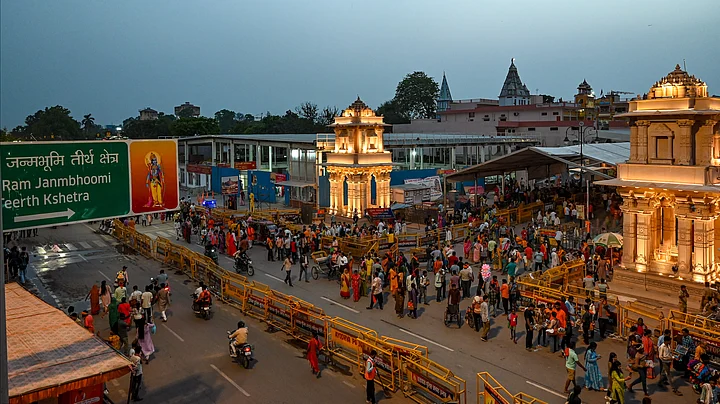It caused quite a stir when the Bharatiya Janata Party (BJP) lost the Faizabad Lok Sabha seat and even the seats around it. When caste is pitted against religion (mandal versus kamandal), the one who organises and educates the masses more effectively wins.
In the 1990s, Mandal politics dominated under the aegis of Kanshi Ram and Mulayam Singh Yadav. The slogan, Mile Mulayam Kanshi Ram, hawa mein uddh gaye Jai Shree Ram, gathered traction and defeated the Brahmanical forces behind the Ram Janmabhoomi Movement.
Despite religion being propagated as a unifying force, caste prevailed. Bhanwar Meghwanshi, author of I Could Not Be Hindu: The Story of a Dalit in the RSS, originally from Rajasthan, joined the Rashtriya Swayamsevak Sangh when he was thirteen. He was amongst the forerunners who went to Ayodhya in 1991. His disillusionment came about when he was asked to have meals prepared for other swayamsewaks at his home. The meals were discarded once they became aware of his Dalit identity. The RSS has always used the SCs, the STs, and the OBCs as vote banks, without divesting any real power or respect to them.
Sooner or later, people from SC, ST, and OBC communities do become disenchanted with the Sangh Parivar. Recently, a seven-term BJP MP from Karnataka, Ramesh Jivajinagi, spoke out against his government and its upper caste inclination. He questioned the absence of Dalits in the central cabinet and expressed disappointment over not being invited to the oath-taking ceremony.
A lot of publicity and resources went into the construction of the Ram temple, which holds the promise of happiness, prosperity, and peace for devotees. However, hardly any energy was invested into the temple itself compared to the elaborate government-centric PR event and projection of the (incomplete) Ram Mandir as an achievement of the Modi government.
The issue of the temple was not enough to sway Dalits, backwards classes, and minorities. When asked why they wanted to win 400 seats in the Lok Sabha in 2024, BJP candidates said they wished to change the Constitution. This alarmed the Dalits, Adivasis, and the OBCs. There is an antecedent to this fear. Mohan Bhagwat, the Sarsangchalak of the RSS, had remarked in 2015 that reservations need to be reviewed. Fearing their rights and identities, the supposed glory of the Ram Mandir appeared washed out.
These two large issues in Indian politics linger over time, situations, resources, and leadership. The Samajwadi Party kept pursuing Bahujan politics but remained biased towards their own party members. Swami Prasad Maurya kept attacking Sanatan and the Hindu religion but the Samajwadi Party did not penalise him, dismissing his comments as ‘personal opinions.’ Swami Prasad Maurya prepared flimsy excuses and finally left the party.
Hindutvawaadis are angry that ‘ungrateful’ Hindus have betrayed the religion by voting for the Samajwadi Party, and have labelled them traitors. People left their homes, collected donations, did kar seva, and shed blood and sweat to build the temple.
Despite these efforts, Dalits and other minorities felt betrayed. In the name of representation, only one Dalit person out of 13 is in the Ram Mandir Management Trust—a disproportionately low number that further enforces the idea that the RSS will never accord Dalits any real power.
Looking at the shoddy work done for the temple, introspection is necessary. Political parties need to realise that faith is a matter of personal belief and shouldn’t be made into a business under the garb of which lower castes can be fooled and exploited.
Those who did not vote for the BJP understand the matter at hand. Some rights and protections are guaranteed when one is born into a caste. Caste is useful in mundan (head ceremony), birthdays, happiness, sorrow and even during death. When political and social expectations are fulfilled by caste, one has to stand by them.
Until now, there was no awakening. It was easy to mobilise Dalits, Adivasis, and OBCs to face off against Muslims. But times have changed. The BJP should be grateful that Dalits and backward classes do not make as much of an effort for caste mobilisation, as they do for mobilisation along religious lines.
There is no serious attempt to consolidate castes, discounting the single caste-based parties. There is a surge in atrocities against them— they are being urinated upon, beaten to death, raped and burnt in the dead of the night without any investigation. Are Dalits and backward classes not seeing this?
The caste barrier remains unbreakable. One cannot convert from one caste to another. Can a Dalit become a Brahmin? Never. They become Buddhists, Christians or Muslims. The Hindus who applaud themselves for not voting for the BJP must attempt to understand the evident exploitation of their religion for political schemes.
When Akhilesh Yadav vacated the chief minister's residence, it was ‘purified’ with Ganga water. In such a blatantly discriminatory situation, would any Yadav vote for the BJP? Why should a Yadav not take pride in his caste and vote, just as you take pride in your religion? It is time to break the caste system for any hope of a just political system.
(Udit Raj is a former BJP MP who now belongs to the Congress Party. He has previously worked for the Indian Revenue Service. This is an opinion piece, and the views expressed are the author’s own. The Quint neither endorses nor is responsible for them.)
(At The Quint, we question everything. Play an active role in shaping our journalism by becoming a member today.)
